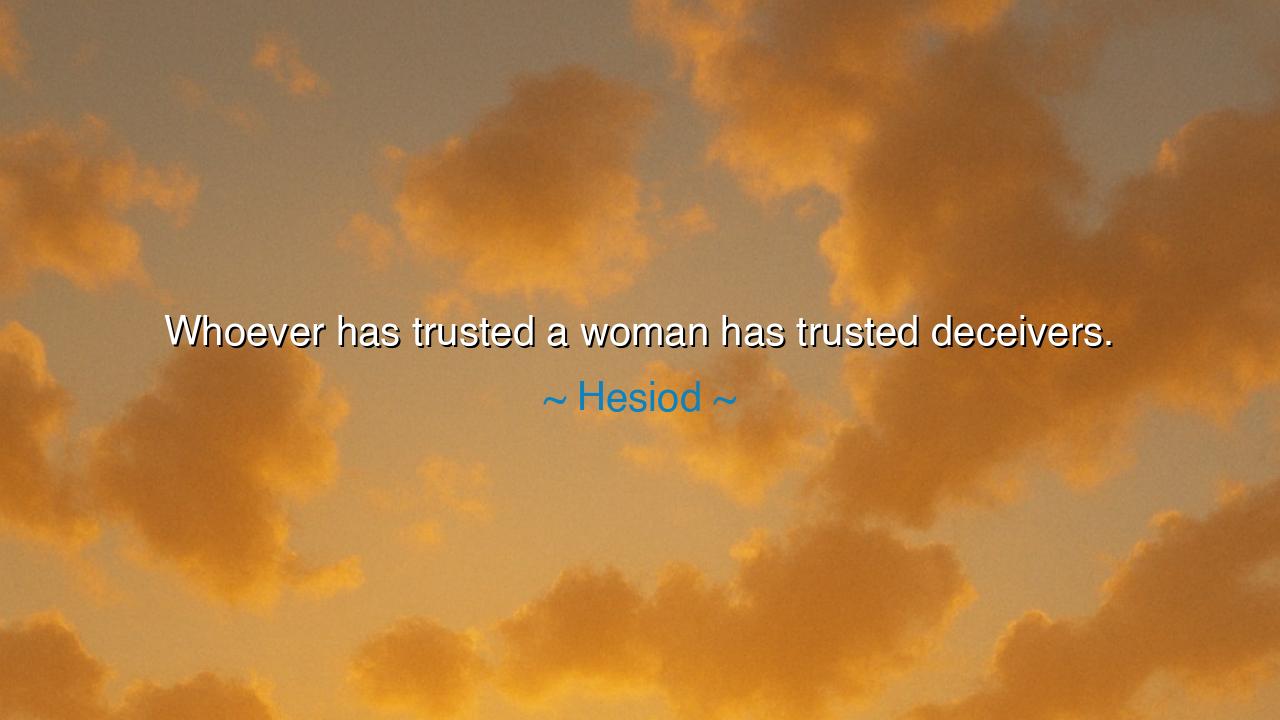
Whoever has trusted a woman has trusted deceivers.






Hear the ancient voice of Hesiod, the poet of Greece, who lived in the shadow of myth and memory. He declared in harsh words: “Whoever has trusted a woman has trusted deceivers.” To modern ears, these words sound bitter, steeped in suspicion. Yet to understand them, one must journey back to the world in which Hesiod lived—a world shaped by myth, where men told tales of Pandora, the first woman, who, by opening her jar, unleashed all sorrows upon humankind. In those days, such stories were less about condemning women themselves and more about warning humanity of the dangers of temptation, desire, and misplaced trust.
The ancients often cloaked their wisdom in cautionary tales. Hesiod, wary of life’s treacheries, spoke with the sternness of one who believed that weakness begins when the heart gives away its judgment. His words reflect a cultural fear—the belief that beauty and charm can mask deception, that the sweetness of love may lead to ruin. To him, woman symbolized the unknown, the alluring force that pulls men from discipline into folly. Though shaped by the customs and prejudices of his time, his warning was meant as a shield, urging listeners to guard their hearts and possessions carefully.
Yet history gives us stories that both affirm and challenge this ancient suspicion. Consider the tale of Samson and Delilah. Samson, mighty in strength, fell under the spell of love and revealed his secret. Delilah betrayed him, and his power was stripped away. This story, echoed across centuries, seems to confirm Hesiod’s warning: that misplaced trust can bring about one’s downfall. But there are also countless tales of loyalty, courage, and love where women stood as protectors, healers, and guides—proving that Hesiod’s judgment, though powerful, was not absolute.
Indeed, one must read Hesiod with discernment. His words spring not from universal truth but from a world where men feared what they could not control. The danger is not woman herself, but blind trust without discernment. Anyone—man or woman—can deceive when the heart surrenders its wisdom. Thus, the quote becomes not a curse upon women, but a reminder to test the worth of every bond, to anchor trust in proven character, and to guard against the blindness that desire can bring.
The deeper lesson here is vigilance. Do not mistake charm for loyalty, nor beauty for virtue. Test every friendship, every love, by the fire of truth. To trust is necessary, for no life can be lived in suspicion alone, but to give trust recklessly is to invite sorrow. The ancients remind us: a wise man or woman opens their heart slowly, discerning who is faithful and who is false.
At the same time, Hesiod’s words invite us to reflect on our own prejudices. If we take them literally, we risk falling into bitterness and distrust of half the human race. But if we interpret them as allegory, we may see them as a warning against the universal possibility of deception—a call to walk wisely, but not to close the heart entirely. For while trust may sometimes lead to betrayal, without trust there can be no love, no friendship, no peace.
So, children of tomorrow, take this wisdom in balance. Do not scorn women, nor any group, for the faults of some; instead, guard your trust as a precious gift. Offer it carefully, not recklessly, and let it be earned through loyalty and truth. Learn from Hesiod’s caution, but do not inherit his bitterness. For the true strength of humankind lies not in suspicion, but in wise discernment—and in the courage to trust again, even when once deceived. This is the way of balance, the way that leads to peace within and without.






AAdministratorAdministrator
Welcome, honored guests. Please leave a comment, we will respond soon